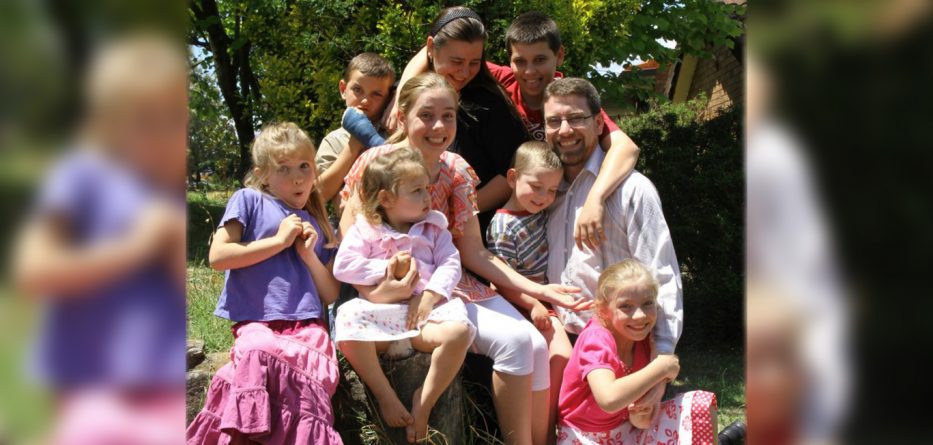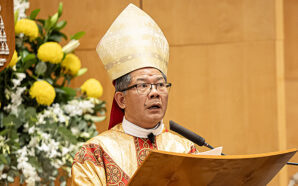Well-known theologian Peter Holmes loves his wife and fathering eight children. Recent difficulty finding a rental home reinforced the importance of sharing the joys of large family life. Catholic Outlook caught up with Peter near his home within the Diocese of Parramatta.
Large families bring palpable blessings and Peter thinks Catholics with large families should share the joys and difficulties of that life with broader society. This is not to say large families are better than other families, Peter was careful to add.
But at a time when couples avoid having children or delay them indefinitely, sharing the practicalities and the happiness of large families is a tonic to a child-phobic society. Guests in the homes of large families often notice the infectious conversation, fun and warmth.
“That’s a large part of it,” Peter says.
“It’s an attitude and an atmosphere of self-giving, give and take, a shared community.”
The family shares life together, with its ups and downs.
“We share music, likes, dislikes, games, movies, fun times and studies. We get involved in each other’s projects and assignments and studies and research.”
“Each one of them has had to make some sacrifice for the good of the others at some stage. They know that and appreciate the sacrifices others have made,” he said.
Another benefit of having a large number of children is that it is easier in some ways than having a small number.
“One of the things I noticed was I found it much harder to be a father of two children than a father of eight,” Peter said. He does not claim this is a universal experience.
“When I was a father of two, I had to be father, counsellor, entertainer, friend, playmate, comforter, listener, all these things. I was everything to those children, except a mother of course.
“Now that I have eight, when I go home they are each other’s playmates, counsellors, comforters, friends, entertainers, and I, in a sense have the luxury of being Dad and being able to be engaged with each of them in that role, having fun, joining their fun, and joining that household in a much more liberated sense, if you like.”
How do the practicalities of a large family work?
In a four-bedroom house, there are bunks in most rooms, so that everyone has a space. A highly organised chores roster means the children take care of most of the chores between them. Neither Mr nor Mrs Holmes has been on the roster for ten years, but they fill in when a child has been sick or not done it.
Bedtimes are staggered, so that children receive individual attention from their parents.
“The younger few have story time with Dad, then they go to bed. Then the next one due to go to bed will have my time,” he said.
“And my teenage daughter, every single time she asks for a phone, which is a ‘no’,” Peter said with a fatherly laugh.
If the regular time is not enough, then the parents make extra time for individual children, such as going on a Father-Son, Father-Daughter outing.
“When you get used to the mode of living, it’s easier to get along with people in other places.”
“You find people who grew up in larger families can get along with difficult people in the workplace.” he said.
How would an introvert cope with a large family? “I’m an introvert,” Peter said with a laugh.
“If you need space, you can find it, it might be at night. It would be a lie to say it’s just an easy thing to do. When you’re loved – everyone wants to be a part of everyone else’s life.”
“When the other children are not interacting with us, they have their own space – with books, games, or using their iPads, laptops, with earphones in a public space.”
“We do encourage that quiet time because it’s a good wind down time for us all.”
What about being able to afford a large family? “A large part of the costs with children are up front,” Peter said.
“It ends up costing us, per head, a lot less, a lot less, than the average person to be in the school system.”
They already have the school uniforms, which children grow out of anyway. Discounts for multiple siblings have also been a saving. Housing and energy bills are another significant expense for each family.
“We have a household with 10 people and a household with four might have roughly the same bills.”
While some people have occasionally berated him about the environment, little did the accusers know they were speaking to a fellow environmentalist.
“My father was a photographer, and a nature photographer, and an artist, and he taught us to respect the environment.”
Peter’s father taught him to preserve the environment as much as possible.
“It’s not the number of people that damages the environment, but the way that people live in it. A huge amount of modern stuff, we just don’t actually need. We don’t all need to have a tiny pre-made sandwich package. You don’t all need to have name brand clothes. And we teach our children to value God’s creation. True, our children eat much better than I did as a child, and have much more fun and have way too many treats. It’s simply that we don’t engage ourselves with the latest fads,” he said.
What about people who are unkind to large families? “Well, you have to accept that people are going to treat you a bit weirdly,” Peter said.
This was especially the case in the recent house hunt.
“After viewing 35 houses, we had 10 applications denied, even though I offered significantly more money than the asking price. I have a perfect rental record. I have never paid a single cent of rent a single day late. I have never lost a Bond. I have excellent references and sufficient income. Several real estate agents told me my application was “strong” but some hinted that I should lie about the number of children on my application. Even if I were tempted to lie, why would I lie about the greatest blessing my wife and I have?”
“I should say that we have been equally overwhelmed by the generous offers of help and support from people who know us. But the point is that they know us. They know that our family is a loving and coherent family and will care for our home.”
“A common theme at the recent Renaissance of Marriage conference was that good Catholics need to open the doors of their homes and lives to others.”
“Instead of only allowing guests to visit when we can present our homes as neat, perfect and organised, we should aim to open our doors to the ordinary, routine, messy and joyful aspects of our lives.”
“People are terrified of having more children, and perhaps even of mixing with large families. One of the most important kinds of evangelisation in this century will be to invite people into the joyful, crazy mess that is Catholic family life.”
“That is how we found a home! In the end it took an excellent family to be open to life and offer their property to us. I think this is the way the culture of life can win.”
“Individuals, and families who dare to hope, dare to be open to the joy and mystery of life, and who open their lives to others who do the same.”
“Thank you to all who offered encouragement and help. Especially to those who put time and effort and even your properties our way. Many said no, but you said yes.”
Details about the Renaissance of Marriage conference and associated resources can be found at https://marriageresourcecentre.org/renaissance/








